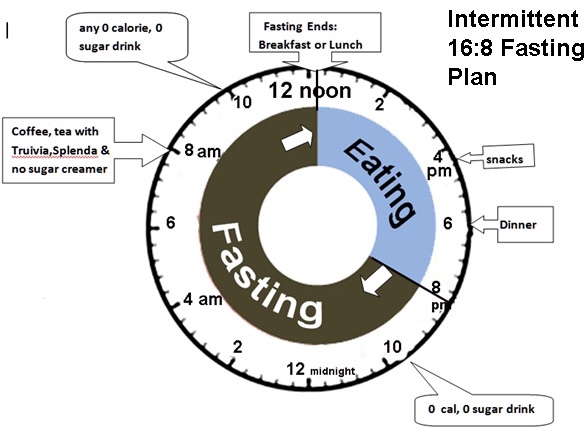
Intermittent fasting may prove to be a helpful technique to lose weight. Intermittent fasting includes avoiding meals during a specific duration and consuming meals for short time periods throughout the day. According to research on weight loss, it was concluded that there was significant weight loss in an individual who followed intermittent fasting for 24 weeks. The major concern in intermittent fasting techniques is the timing of meals, unlike other weight loss programs, which are more concerned about the type of foods. Some of the common intermittent fasting techniques include:
- Alternate day fasting: Consume 30 percent of calories every other day and eat normally on non-fasting days.
- The 5:2 Diet: Eat normal amounts of food during 5 days a week and fast on the remaining 2 days. Consume about 500 to 600 calories on fasting days.
.jpg)
- The 16/8 method: Consume meals for 8 hours of the day and fast for 16 hours.

Effects of Intermittent Fasting on Body Metabolism and Hormones
Body stores fat as a source of energy, but when a person fasts, different deviations occur in the body that includes the changes in the nervous system and hormonal activities. Intermittent fasting affects the hormones in such a way that they interfere with the body’s metabolic activity. Here we will discuss the hormones which are involved in changing the metabolic activities of the body that favor fat loss.

- Insulin levels are high when a person eats, but during fasting, insulin levels start to decline, which increases lipolysis, especially in the adipose tissues helping in fat burning and weight loss.
- Levels of growth hormone rise significantly in fasting condition. If a person fasts for more than 12 hours, the growth hormone may increase 5 times than its normal levels. Growth hormone aids in muscle building and fat loss.
- During low energy state, noradrenaline is released from the nervous system that works on receptors present on fat cells, causing the breakdown of fats into free fatty acids. These free fatty acids enter the bloodstream and are metabolized mainly in the liver to produce energy.

How Intermittent Fasting Helps in Weight Loss
Intermittent fasting helps to lose weight by decreasing the total caloric intake during the day. Skipping the meal results in less calorie consumption, so the body draws energy from stored fat instead of a diet. If a person compensates for its food requirements in the non-fasting period, it will still be difficult for him to consume a large number of calories. This makes intermittent fasting one of the most suitable ways to lose weight. The daily calorie count is not important if you are following any of the intermittent fasting plans. Weight loss depends upon overall caloric consumption.


Intermittent fasting can lead to significant weight loss. According to the researchers, a group of people who adopted this method for weight loss during a time period of 3 weeks to 4 months successfully reduced their body weight by 3-8%. Alternate day fasting and 16/8 fasting method have different results. The Group of people who adopted the alternate-day fasting method lost an average of 1.65 pounds per week, while those who adopted the 16/8 fasting method have less satisfying result that is 0.55 pounds weight loss per week. Intermittent fasting helps in belly fat loss. People observed a 4-7% decrease in waist circumference after a few weeks of intermittent fasting. These results convinced researchers to rate the intermittent fasting method as one of the best weight loss techniques if followed properly. Short term intermittent fasting is more effective than long term intermittent fasting. Short term fasting increases the metabolic rate, while long term fasting may suppress it. According to researches, short term fasting throughout the week may boost metabolism as much as 14%.

Benefits of Intermittent Fasting
Weight Reduction
Muscle loss or wasting is a common side effect that occurs in many people following weight loss plans. But if you are adopting intermittent fasting for fat loss, you do not need to worry about this side effect because intermittent fasting can help in significant fat loss with no decrease in the muscle mass. Some people may observe a little reduction in muscle mass, but it is usually negligible (less than 10% of total weight loss.)

Improving Blood Pressure and Heart Health
Change in lifestyle and diet is the most effective way to decrease the risk of heart disorders. According to some studies, incorporating fasting into your daily routine is very beneficial for your heart health. It reduces the levels of blood triglycerides and bad LDL cholesterol by 32% and 25%, respectively.
.jpg)
Intermittent fasting has many other health benefits apart from weight loss that includes chronic disease prevention, such as diabetes, increased cholesterol levels, myocardial infarction, and stroke.
.jpg)


.jpg)